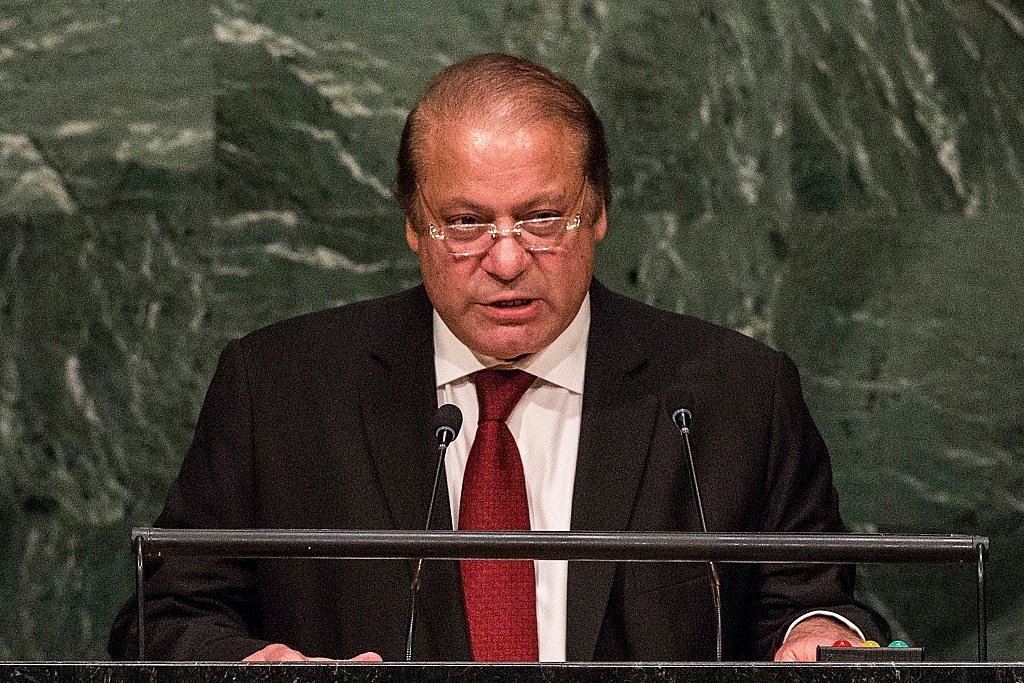World
Why Pak’s ‘Diplomatic Isolation’ Means Nothing; In Realpolitik, Bad Guys Win
- Diplomatic isolation is not going to make any difference to Pakistan’s terror infrastructure targeted against us.
- In Pakistan’s case, neither the US nor China is ever going to abandon it or declare it a terrorist state.
- The world fears bad boys more than good boys, and will thus go out of its way to humour bullies who can do damage, and not those who try and practice “strategic restraint.”

Nawaz Sharif at the UN in 2015 (Andrew Burton/Getty Images)
There was much exultation on TV channels this week over Pakistan’s growing “isolation” after the Uri terror attack; much has also been made of the formal condemnation of terrorism by the US, Russia, Britain, France and even China. The Times of India ran a big graphic today (22 September) talking of a “Big Chill in US-Pak ties”, pegging the story on a bill in the US Congress to designate Pakistan as a state sponsor of terror and the US decision to block military reimbursements worth $300 million last month.
While
Pakistan’s discomfiture over the fingers pointing in its direction may give us
some psychic satisfaction, we have to be realistic about thinking that some
degree of diplomatic isolation is going to make any difference to Pakistan’s
terror infrastructure targeted against us. While there is no harm in trying to
rub Pakistan’s nose in the dirt through diplomatic manoeuvres, “isolation” will
never achieve anything. There is almost no instance in recent history – the
exception possibly being the ending of apartheid in South Africa - where “diplomatic
isolation” has achieved any desirable end.
Consider
three cases.
There is no
greater international pariah than North Korea, but it continues to do what it
wants, exploding nuclear device after nuclear device, and the net result has
always been concessions by the international community.
There were strong
international sanctions against Iran for pursuing a nuclear weapons programme,
and despite the harm done to the Iranian economy for years, in the end the US
did a deal with Iran that can in no way be called a full climb-down by that
country.
Syria was
declared an international violator of human rights and rebels were armed by the
Saudis and Americans to topple the Bashar Assad regime. But both Iran and
Russia batted for Assad, and the “isolation” of Assad is nearly over. He may
still be toppled at some convenient time, but once again this only proves that there
is no alternative to coercive action.
In Pakistan’s
case, as in North Korea’s, neither the US nor China is ever going to abandon it
or declare it a terrorist state. Not when it has a nuclear arsenal. The US
considers Pakistan both an asset and a liability, and so will continue to engage
with it to make the ledger positive for itself. The US is not going to go after
Pakistan to please us. Even the EU and Russia will not do so. If none of this
happens, what good will its “diplomatic isolation” achieve for us? At best,
Pakistan will feel unloved for a while, and take its anger out on us ever more
forcefully. Not that we should fear that, but one should underline the relative
pointlessness of diplomatic isolation as a key element in anti-terror strategy.
The only
isolation the Pakistani Deep State may actually fear is to become unloved in
its own country. This means we must court the civil society in Pakistan, to the
exclusion of the army. If, at some point, this defangs the Pakistani army, well
and good. But diplomatic isolation won’t work, for when the world is seen as
your enemy, the tendency of citizens will be to close ranks with the
government.
In any
case, when China is never going to abandon Pakistan as long as it can be used
to keep India in check, where is the isolation?
The world
fears bad boys more than good boys, and will thus go out of its way to humour
bullies who can do damage, and not those who try and practice “strategic
restraint” – like us. Strategic restraint will get us a pat on the back, some
theoretical brownie points, but no tangible benefit. And if strategic restraint
only means impotence, and is not backed by real underlying power, we will be
laughed out of court.
In realpolitik, it is the ability to cause harm that draws attention, not the inability to do so. Bad boys will always get what they want; the good boys will get nice words. And nothing else. We should stop courting compliments from the world and get real about building our long-term economic and military might. The world respects strength, not weakness.
Support Swarajya's 50 Ground Reports Project & Sponsor A Story
Every general election Swarajya does a 50 ground reports project.
Aimed only at serious readers and those who appreciate the nuances of political undercurrents, the project provides a sense of India's electoral landscape. As you know, these reports are produced after considerable investment of travel, time and effort on the ground.
This time too we've kicked off the project in style and have covered over 30 constituencies already. If you're someone who appreciates such work and have enjoyed our coverage please consider sponsoring a ground report for just Rs 2999 to Rs 19,999 - it goes a long way in helping us produce more quality reportage.
You can also back this project by becoming a subscriber for as little as Rs 999 - so do click on this links and choose a plan that suits you and back us.
Click below to contribute.
Latest